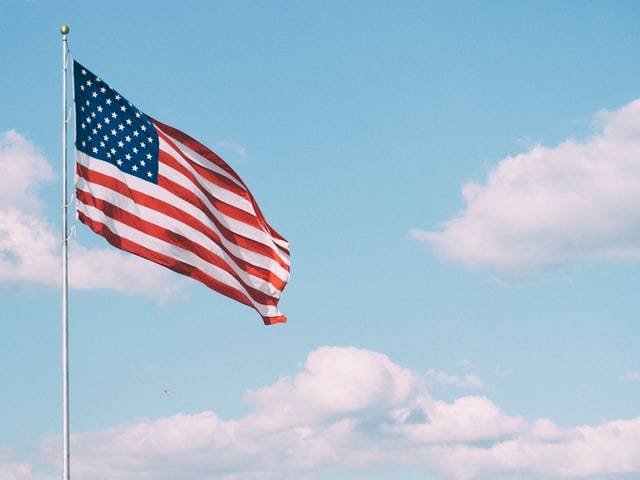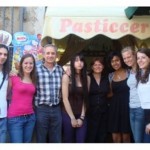Coming to Terms with Being an American Abroad

Tuscania isn’t the same as Tuscany, although that’s a mistake people often make. Instead, it’s a teensy medieval commune north of Rome where I studied in the spring of 2016. In my time packing and prepping beforehand, I made a decision: I would strip myself of as much of my American-ness as possible. I would not be the rude American abroad demanding that the culture adapt to me. Instead, I would learn Italian. No, better than that, I would be Italian.
My expectations of myself were brutal and ungracefully impossible. They were uncomfortable in little ways, like how I stopped myself from putting too much sugar in my espresso. When I met my now boyfriend, a native of Tuscania, and went out with his friends, I barely allowed myself to speak unless each word was in Italian. I praised their culture and felt strange talking about my own — besides regaling tales of Minnesotan winters, which always received wide-eyed, impressed reactions.
Digging inside myself, I tried to understand why I so badly wanted to avoid being seen as an American abroad.
My expectations were strange in the big ways too. I avoided my American-ness by telling people: “My Dad is German and my Mom is Irish.” This was never received the way I intended. Phrases like these are the bread and butter of elementary school lineage projects across the USA. Yet, for many foreigners, such a phrase says something to the effect of “My Dad is quite literally off the boat from Germany, and my Mom moved over from Ireland in ‘93.” I had to re-examine the weight I placed on my parents’ ancestry.
I wrote bubbling, pensive, two-dimensional blog posts detailing how “Each morning and evening, I walk to class. While doing so, it is difficult to avoid romanticizing Tuscania’s streets. They smell of fireplace and cigarette smoke, medieval stone, cologne, and flowers. Shops are inlaid among the medieval walls with signs indicating their use. As we left a spa today, one of my classmates blandly commented, ‘Italians have no problems whatsoever, do they?’ While I’m sure they have their fair share, the only impression I’ve received from Tuscania thus far is of contentment and joie de vivre.”
Somewhere my parents have embarrassing pictures from YMCA basketball camp and prom. My grandparents live in Iowa, for goodness’ sake. Mamma mia, I’m as American as they come!
I reveled in the mystical history of the town center and reserved judgement of any form. Upon talking with my boyfriend about this, he sweetly replied “You are admiring the people. You are saying ‘hey I want to be like you.’ We are breaking walls between cultural differences. We are connecting everyone.”
It was true. There’s a kind of loveliness in seeing differences as beautiful. However, isn’t it also thoughtful to consider the way my culture interacts with the environment around me? Digging inside myself, I tried to understand why I so badly wanted to avoid being seen as an American abroad. I originally theorized it would be most ethical to try and avoid Americanizing parts of my day-to-day life. Italy already experiences enough influence from American culture.
Coming to Terms with Being an American Abroad.
Nevertheless, I moved through Tuscania as a person with memories and rituals that scream “American”, such as celebrating the Fourth of July under glorious fireworks displays, and singing the national anthem on Memorial Days past. Somewhere my parents have embarrassing pictures from YMCA basketball camp and prom. My grandparents live in Iowa, for goodness’ sake. Mamma mia, I’m as American as they come!
My American-ness is evident in the way I move, my style of dress and how I debate. Telling myself I could stop, drop and roll away from my own culture in the midst of another reflected disrespect for all involved.
Gradually, I permitted my American-ness to become a part of me as I interacted with the landscape and the people. Doing so included answering why the 2016 presidential election turned out the way it did. I appreciated the differences in how time is viewed at home compared to in the Italian countryside. Transnational feminism became real; the challenges women face in Italy contrasted from those at home. The dialogue opened my eyes to the complexity of issues like the refugee crisis and globalization.
Telling myself I could stop, drop and roll away from my own culture in the midst of another reflected disrespect for all involved.
Several months after my study abroad experience, I returned to Tuscania for Christmas and participated in several Italian Christmas traditions. La Befana gave me a sock full of candy (unlike Santa, she prefers you set out a glass of wine the night she visits, thank you very much.) I ate Panettone and talked about the weather in Minnesota, which was cold and snowy as per usual. After midnight mass my boyfriend and I went out to the bars together.
Standing in the yellow light on the slick cobblestone streets, I chatted with a friend and fellow journalism student. The two of us compared journalism in the States with Italian journalism. We were both equal contributors to the conversation, switching between English and Italian.
I may have over-complicated thinking about my presence as an American during my early time in Tuscania. But this: the giving and learning, the celebration and frustration of my American identity, will most likely continue as long as I plant myself on foreign ground.
Photo for Coming to Terms with Being an American Abroad by Unsplash.








